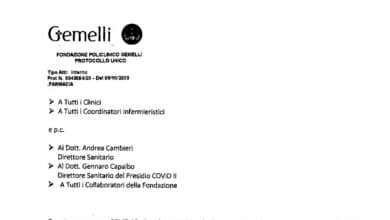
Testa (Snami): one of the "determining factors that gave a significant contribution to the worsening of health conditions was the promotion, not adequately regulated from a medical point of view, of the prescription and use of equivalent medicines that could be substituted for each other during therapy."
 Rome, 7 December – The increase in the prevalence of certain diseases in the elderly population in recent years? Angel Head, president of Snami (the autonomous national union of Italian doctors), seems to have no doubts: one of the "determining factors that has made a significant contribution to the deterioration of health conditions”, in his opinion, "was the promotion, not adequately regulated from a medical point of view, of the prescription and use of equivalent medicines that can be substituted for each other during therapy.
Rome, 7 December – The increase in the prevalence of certain diseases in the elderly population in recent years? Angel Head, president of Snami (the autonomous national union of Italian doctors), seems to have no doubts: one of the "determining factors that has made a significant contribution to the deterioration of health conditions”, in his opinion, "was the promotion, not adequately regulated from a medical point of view, of the prescription and use of equivalent medicines that can be substituted for each other during therapy.
Testa refers to Istat data which reveal an increase, in the last five years, in the prevalence of certain pathological conditions in the elderly: diabetes goes from 12.5% to 14.5%, arterial hypertension from 36.5% to 40.5%, l myocardial infarction from 4% to 6.3%, osteoarthritis from 52.5% to 56.4%, osteoporosis from 17.5% to 18.8. A progression in which, according to the doctors of Snami, the substitutability of drugs would also play a role, imposed “on a global scale” by specific legal provisions, however responding more to the logic of cost reduction and economic savings than non-healthcare and established itself for the acceptance, on a general level, of the concept that equivalent drugs are interchangeable with each other during the therapy phase because they are substantially identical in terms of effectiveness.
But, observes Snami, replace the starting drug - whether it is a generic or a branded specialty - with its equivalent "during the phase of treatment, exposes to an (incalculable) risk of complicating the pharmacological management of the disease and, in some cases, can even make the medical prescription itself ineffective.
 Hence Snami's decision to conduct an information campaign among doctors, through the organization of a series of dedicated appointments throughout Italy, to “bringing responsible healthcare professionals to a higher level of subject knowledge.” The meetings, which began last May in Pisa and continued in various cities of the peninsula, will conclude in Matera (December 12) and Reggio Calabria (December 19).
Hence Snami's decision to conduct an information campaign among doctors, through the organization of a series of dedicated appointments throughout Italy, to “bringing responsible healthcare professionals to a higher level of subject knowledge.” The meetings, which began last May in Pisa and continued in various cities of the peninsula, will conclude in Matera (December 12) and Reggio Calabria (December 19).
The declared objective of the Snami campaign, now nearing its conclusion, is to make people understand the importance of constant therapy in the treatment of diseases, especially chronic ones, always taking into due consideration the possible clinical complications that could arise from a continuous (or even single) change of equivalent medicines during therapy.
"There are many objective reasons why you may have the obligation to give only one type of drug to the patient" Testa explains "these motivations are incontrovertible and it is on the basis of these that the possibility opens up of returning control of the therapy to the hands of the prescriber and therefore respecting the patient's right to be treated in the best possible way".
Related news: Naples. Medical prescriptions and substitutability of drugs, doctors in comparison
Snap me. Substitutability of medicines and the right to the best treatment
Snap me. Unjustified saving frenzy
The Eutirox scandal: the generic analogue drug causes serious damage to health






